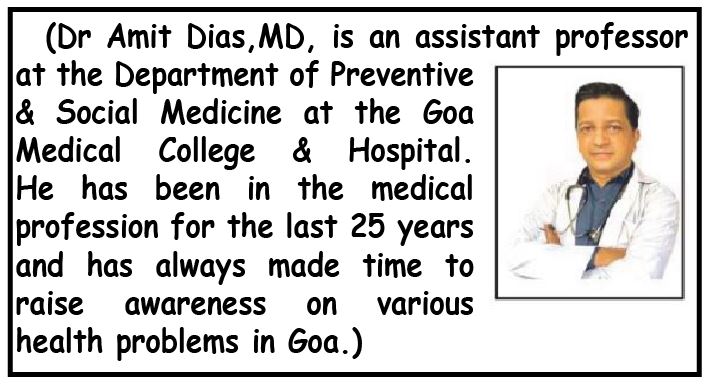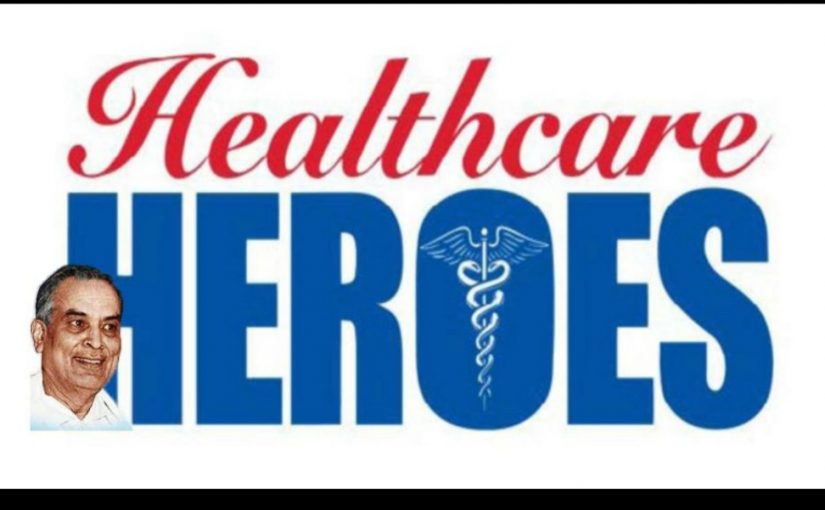On the occasion of National Doctor’s Day, observed on July 1, we need to understand how to get the best out out of doctor-patient relationships. Let Dr Amit Dias tell you this time about doctor-patient relationships and how to achieve optimal health and wellbeing. He share some valuable tips with along with the reminder, a quote from the father of medicine, “Wherever the art of Medicine is loved, there is also a love of Humanity.”
An interview with Dr Amit Dias
Goan Observer: We want to start by wishing you and all doctors a Happy Doctor’s Day! Can you throw some light on why we observe July 1 as National Doctors Day?
Dr Amit Dias: Thanks for your wishes. National Doctor’s Day is celebrated on July 1 in India to honor the birth and death anniversary of Dr Bidhan Chandra Roy (BC Roy). The day recognizes the contribution of doctors and their commitment to providing quality healthcare services to society.
Q: We appreciate what our healthcare heroes do. What according to you is the difference between a good doctor and a great doctor’?
A: I would answer this in the words of Sir William Osler: “The good doctor treats the disease; the great doctor treats the person who has the disease.” We need to be person-centered in our approach and empathy should be the hallmark of every physician. A lot can change with the right approach and building a healthy doctor-patient relationship.
Q: In a world full of relationships good and bad, what is the role of a doctor-patient relationship?
A: The doctor-patient relationship is a partnership based on mutual trust, respect and collaboration. It involves effective communication, shared decision-making and empathy from both parties. Doctors provide medical expertise, guidance and treatment options, while patients contribute their insights, preferences and adherence to the prescribed or recommended care plan. A strong doctor-patient relationship is crucial for optimal healthcare outcomes and patient satisfaction.
Q: How can a patient get the best out of such a relationship? How should a patient prepare for a visit to a doctor?
A: We aim to attain the best of health. Let me simplify this by using the word –HEALTH — to help you remember what you need to do.
H: History — Provide your complete medical history as well as the current symptoms to the doctor. Health problems are often related.
E: Expectations — Define your expectations and concerns with the doctor. Google information can be misleading.
A: Arrival — always be on time and bring necessary investigations and files to avoid repeat visits.
L: Listen — Listen attentively to what the doctor says, get someone along if you think you cannot remember.
T: Treatment —Understand the prescribed treatment plan, follow it and report back. Report back if it’s not working as well.
H: Healthy choices —Discuss other lifestyle changes or preventive actions for overall health.
Q: Can you further elaborate on how to prepare to give a good history and understand the treatment?
A: Today we often see patients who have typed in their symptoms on Google and come to the doctor with a self-diagnosis. The patient should maintain a file and organize his or her medical history, including current medications, past surgeries, allergies and family history of illnesses. It’s also essential to write down any symptoms they are experiencing and questions they have for the doctor.
Bringing a list of current medications, insurance information and relevant medical reports can also help streamline the consultation process. The doctor will help you with it. But if you are prepared, it will make the process much better and can help the doctor tailor his treatment to your special needs. If you cannot afford any medication, be honest and speak to your doctor. A cheaper alternative may be available.
Be concise and direct about their symptoms, concerns and medical history. It’s helpful to prioritize questions and issues to discuss during the appointment. Following the doctor’s recommendations, asking for clarification when needed, and actively participating in the conversation can result in a productive outcome.
With regards to treatment — listen to the doctor — the drug pantaprazole for example, is recommended to be taken on an empty stomach for optimal action. In contrast, some have to be taken after a meal, such as ibuprofen, to reduce the risk of stomach irritation and gastritis. Some have to be taken in the morning while others at night. Some once a week, while others once a day. Do not change and do not exchange medications with another family member, it may not be the same, it may not be the same doze and it can have catastrophic outcomes.
Q: We have learnt a lot about National Doctor’s Day. Can you tell us more about the life and contributions of Dr BC Roy?
A: Dr Bidhan Chandra Roy, often referred to as Dr BC Roy, was a distinguished physician, freedom fighter and politician. He served as the second chief minister of West Bengal from 1948 until he died in 1962. Dr Roy was a pioneering figure in Indian medicine and played a significant role in establishing healthcare institutions like the Indian Medical Association (IMA) and the Medical Council of India (MCI). His contributions to public health and medical education have had a lasting impact on the healthcare landscape of India. Every year the president of India gives the BC Roy Award, which is the highest award in recognition of the contributions of a physician. This year the award was given to our very own Dr Satish Kudchadkar from Goa. A few years ago Dr Wilfred D’Souza, our former CM, also received the prestigious BC Roy Award.
Q: We are forever indebted to healthcare providers and are very much concerned about the instances of violence against doctors. So many have lost their lives. How do you think one can prevent violence against doctors?
A: The negative portrayal of doctors in movies and the media should stop. The image of doctors in the minds of the present generation is changing due to a few people in the profession who have slipped up. To prevent violence against doctors, it is crucial to enhance communication, trust and respect between healthcare providers and patients. Implementing strict security measures in healthcare facilities, promoting awareness campaigns on the challenges faced by medical professionals, and fostering a culture of zero tolerance for violence are essential steps.
Additionally, ensuring timely resolution of patient grievances, addressing healthcare system shortcomings and improving doctor-patient relationships can help mitigate incidents of violence.
Q: What is your advice on National Doctor’s Day? How can we contribute to doctors’ Happiness?
A: The only thing that makes a doctor happy is a happy patient! So be happy and follow our advice to maintain good health. I would end with an insightful quote from the father of medicine — Hippocrates. He said this several centuries ago: “Wherever the art of medicine is loved, there is also a love of humanity.” Think about it. I wish everyone the best of health and happiness!


